Serendip is an independent site partnering with faculty at multiple colleges and universities around the world. Happy exploring!
Towards Day 7: "To lose oneself ... requires a different schooling"

DISCUSSION NOTES FROM FATCATREX AND SUPERMARIOGIRL
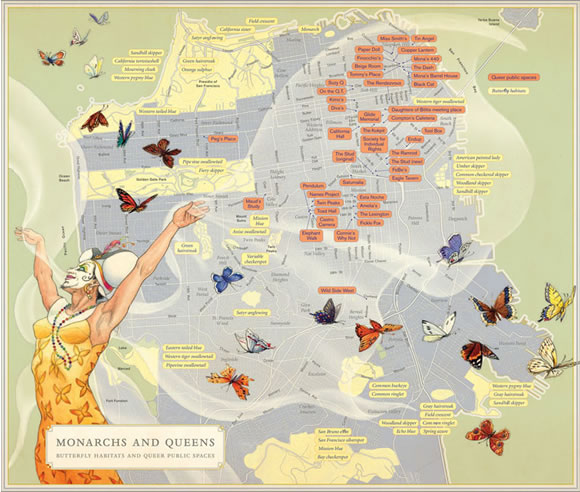
an image to get you thinking about map-making as a (non?) fictional representational form, from Solnit's upcoming book, Infinite City: "Monarchs and Queens," juxtaposing the habitats of local butterflies with the shifting locations of queer public space (!)
I. but first: some coursekeeping
* naming one another
* signing-in
* signing-up for notetaking (and conferences): Amanda and Pamela
* today's notetakers: Emily and Audrey
* webpapers easily accessible from top of homepage
if you are not on this list please see me after class;
maht91 also to consult about uploading and inserting images
* conversation about the experience of web publishing?
(you are of course welcome to read one another's work;
* I will finish responding publicly by this weekend; so far,
I've read--and linked up to one another--
three pieces that explore the question of copyright,
by ckosarek, platano and Smacholdt,
two more on plagiarism, by tgarber and kgould,
and one about trusting the author, by maht91.
* I especially appreciate the way some of you have begun to
exploit the resources of the internet for these web-based papers; see, for example, kgould's quotation of the "dancing baby," and ckosarek's use of paired sound tracks to pose her question.
(All of you can do more in this regard-->
think of titles to draw others in, etc. etc.)
* for Thursday: finish reading
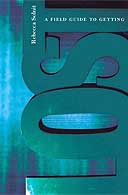
II. Some not-unrelated things I learned in a faculty
teaching seminar led here by Ken Bain last Friday:
* research shows that people are led to take a deep approach to learning when they are trying to answer questions and solve problems they regard as important
* the problem is that in the formal educational environment,
the learner is not in charge of the questions
* instead, students engage in surface or strategic learning: driven by fear and desire for recognition, they learn procedurally, not conceptually; won’t take risks; and seldom develop adaptive expertise (vs. mastering routines).
* our current "diet of assessment"--the system of grading that defines our educational objectives --is a very recent product of the industrial revolution: the result of a need to certify how much education has taken place
* manipulated by extrinsic motivation, students feel a loss of the locus of control: they are not in charge of their own education (and so cease to care about it)
* how to create "expectation failures" (when their existing models don't work =getting lost??) that students care enough about to construct new ones?
![]()
* our on-going faculty seminar project:
** re-defining American higher education
** paying attention to research about how people learn
** creating (promising/enticing) learning environments where students will define what will happen, and understand their own learning
III. Smacholdt built a nice bridge from where we've been to where we're going, from her "changed attitude about comics": Because of the interplay of text and pictures, graphic novels bring new dimension to narratives that traditional novels are not able to, simply due to the medium.
...to her "getting lost in the book": I think that, in opposition to Fun Home, prose is a good form for ... A Field Guide to Getting Lost. Pictures allow the reader to follow the story more intimately, where as with prose, the reader is able to "lose" herself in the text. The mix of stories, facts, and personal anecdotes ... are varied enough that I did not know what to expect next as I read.
[how would you characterize the structure of this book?
how compare it w/ Shields' and Bechdel's?]
I especially enjoyed and could relate to Solnit 's musings on children and getting lost. She says that, "For me, childhood roaming was what developed self-reliance, a sense of diretion and adventure, imagination, a will to explore, to be able to get a little lost and then figure out the way back. I wonder what will come of placing this generation under house arrest." I agreed with Solnit that ... getting lost is an important part of growing up ....

II. warned/promised you that we would begin today thinking about map-making as a (non?) fictional representational form:
a way to manage the transition from thinking about graphic narrative
as a very layered form of representation, with a long historical context (ckosarek: perhaps Bechdel's work is making a larger point about collective knowledge than Shields' work is ....) to "getting lost"...
what I didn't warn you is that we would begin by
making a few maps of our own, as a way of working
experientially w/ the constructedness of the form...
inspired by mkarol's earlier posting about the "unreality"
of maps (vs. the reality of feeling and emotion...)
* map your life, with dates, onto U.S./world maps (year you were born (and where); where you are now (and when); several other significant locations in space and time. Feel free to add details to the maps. (Can you start on a story that begins in one of those locations, and ends w/ another...?)

* now: map the world as you see it, from your own point of view
...each of our lives traces its own map onto the shared terrain (Solnit, p. 174).
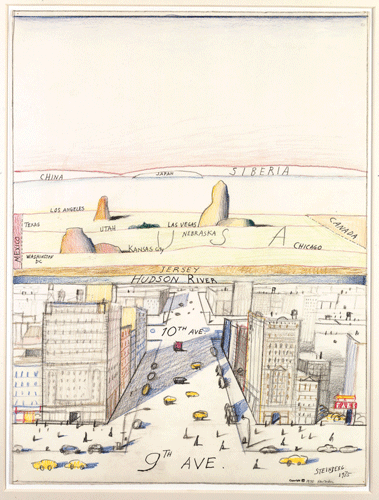
Saul Steinberg, "View of the World from 9th Avenue" (1976)
*finally, map the blank spaces in your world:
what do you not know? how can you represent that?
draw your own terra incognita...?
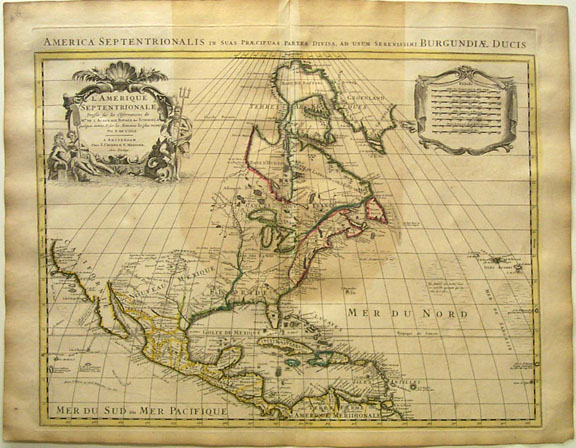
How do you go about finding those things that are in some ways about extending the boundaries of the self into unknown territory, about becoming someone else?.... To calculate on the unforeseen is perhaps exactly the paradoxical operation that life requires of us .... "To lose oneself ... requires quite a different schooling" (pp. 5-6).
What sort of map can guide you here? (Anyone want to share her map and an explication of what went into making it....?)
any place can be mapped infinite ways .... maps are deeply selective .... maps cannot be commensurate with their subject .... No representation is complete (Solnit, p. 162).
Perhaps fantasy is what you fill up maps with rather than saying that they too contain the unknown (p. 164).
...we navigate by stories, but sometimes we only escape by abandoning them (p. 181).
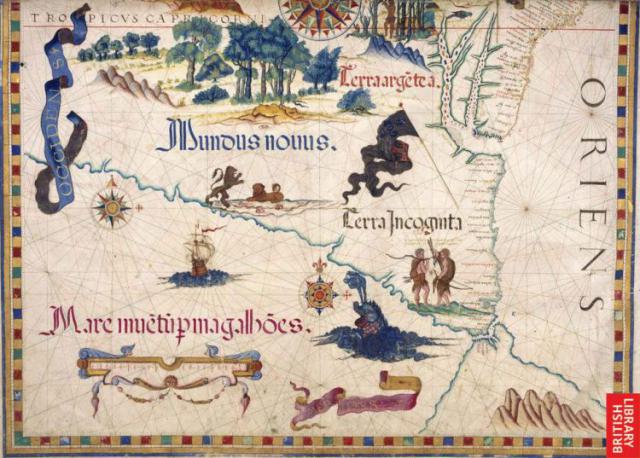
Solnit on Finding Time: THE FOUR HORSEMEN OF MY APOCALYPSE are called Efficiency, Convenience, Profitability, and Security, and in their names, crimes against poetry, pleasure, sociability, and the very largeness of the world are daily, hourly, constantly carried out. These marauding horsemen are deployed by technophiles, advertisers, and profiteers to assault the nameless pleasures and meanings that knit together our lives and expand our horizons.
DISCUSSION NOTES FROM FATCATREX AND SUPERMARIOGIRL


